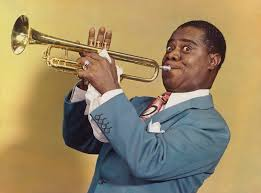Louis Armstrong
Started out as a trumpet player after getting an abused one from his orphanage. Nicknamed Louis "Pops" Armstrong, he was the first trumpet player of the standard Jazz (Definition) age in the 1920s.

Blacks initially hesitated to like him, mainly because he became too popular with white folks (and thus it didn't accurately reflect their culture). Players like Miles Davis, who were less for the camera, criticized how much he like the popularity of the white folks. But over time, they started to appreciate the complexity of his pieces.
He also was successful due to his hardworking ethic. He especially talks about how he never took a break in practice, even when doctors advised it.
- He was one of the first true Soloist players.
- He was fluid in his rhythmic conception of the solos
- It's definitely swing, and not Ragtime
- He's thinking ahead in his solos (to know how to move the melody in the right direction and setting yourself up)
- He composed his solos as he went.
- He had a total command (confidence) of his trumpet, a true virtuoso
Contrast his playing of Dipper Mouth Blues, the more Original Dixieland Jazz Band style of playing (notice a distinct Ragtime and disorganized feel), with what he'd play when playing Jubilee. Notice:
- The second piece feels just like a marching band piece.
- His solo in the second piece he plays super high (showing his control, and his power).
- In the first one the improvisation is more jumbled (everyone is playing, it's organized chaos).
Listen to more of his solos in his band Louis Armstrong and His Hot Five. A lot of what is made on his big band was made